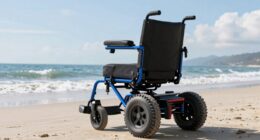As you navigate the challenging world of managing behaviors in dementia, picture yourself as a skilled captain guiding through rough waters. The 6 R’s act as your compass, aiding you in navigating through tough situations, but mastering them requires patience and consistent practice.
As you embark on this journey, a deeper understanding of each R will equip you with invaluable tools to navigate the complexities of dementia behaviors. By embracing these strategies, you can cultivate a sense of calm amidst the storm and truly make a difference in the lives of those under your care.
Key Takeaways
- Understanding dementia aggression origins aids behavior control.
- Reassurance through touch and words promotes security and calmness.
- Effective redirection to positive activities lessens distress in dementia patients.
- Tailored approaches in communication and interactions foster supportive environments.
Recognize
Recognize the significance of understanding dementia aggression for effectively managing behaviors in individuals with dementia. Dementia, a disease that affects millions worldwide, can manifest in various challenging behaviors, including aggression. Nancy, a person living with dementia, may exhibit aggression due to a range of factors such as confusion, fear, or frustration. Managing these behaviors requires a deep understanding of the root causes behind the aggression. By recognizing that aggression is often a symptom of an unmet need or a response to a stressful situation, caregivers can approach Nancy’s behavior with empathy and compassion.
Difficult behaviors like aggression can be de-escalated through the 6 Rs approach, a structured method that focuses on rethinking, reframing, and redirecting the behavior. By acknowledging Nancy’s feelings and validating her experiences, caregivers can effectively address her aggression. Understanding the triggers that lead to aggressive outbursts and proactively rechanneling this aggression into positive outlets can lead to improved outcomes in behavior management. Through recognizing and empathizing with Nancy’s challenges, caregivers can create a supportive environment that fosters better behavioral responses in individuals with dementia.
Reassure

When managing behaviors in individuals with dementia, providing reassurance through touch or verbal comfort is a crucial aspect of alleviating distress and promoting a sense of security. Dementia patients often experience confusion and fear during difficult behaviors, and reassurance plays a vital role in helping them feel calm and supported.
Physical contact, such as holding a hand or offering gentle pats on the back, can convey a deep sense of security and comfort to those struggling with dementia-related challenges. This form of reassurance isn’t just about words but also about the power of touch in conveying support and understanding.
Re-direct
To effectively manage challenging behaviors in individuals with dementia, guiding them towards safe and positive activities through redirection is a key strategy for promoting a sense of well-being and reducing distress. When faced with aggression or challenging behaviors, it is crucial to redirect their focus towards calming and engaging tasks. By offering distractions, changing the environment, or engaging in soothing activities, you can help shift their attention away from negative behaviors. Effective redirection not only de-escalates aggression but also promotes a more positive outlook and overall well-being for the individual with dementia.
| Strategies for Re-direction | Examples of Application |
|---|---|
| Offer distractions | Singing a familiar song |
| Change the environment | Moving to a quieter room |
| Engage in soothing activities | Providing a sensory stimulation kit |
| Focus on positive activities | Painting, gardening, or listening to music |
Re-approach

Empathizing with the challenges faced by individuals with dementia is crucial in the process of re-approaching their behaviors and interactions. When you take the time to understand the confusion, frustration, and limitations that the person with dementia experiences, you can adapt your communication and interactions to better meet their specific needs.
By re-approaching how you connect with them, caregivers can provide more effective support and help reduce distressing behaviors. This approach not only benefits the individual with dementia but also enhances your ability to care for them.
Through improved understanding and tailored interactions, you can create a more supportive environment that fosters a sense of security and comfort for the person in your care. Remember, by re-approaching your approach, you can make a significant difference in the well-being of individuals with dementia and strengthen the bond between you and them.
Re-evaluate
In dementia behavior management, re-evaluate plays a crucial role in refining caregiving strategies and interventions based on past experiences to enhance effectiveness. When re-evaluating strategies, it’s important to:
- Identify Patterns and Triggers: Reflect on past behaviors and responses to recognize recurring patterns and triggers that may influence dementia-related behaviors. By understanding these patterns, caregivers can proactively address triggers and prevent escalations.
- Make Adjustments for Improvement: Review and revise approaches used in similar situations to better handle them in the future. This process allows caregivers to fine-tune their responses, making them more effective in managing challenging behaviors.
- Create a Feedback Loop for Continuous Learning: Re-evaluation fosters a feedback loop that supports continuous learning and enhancement in dementia behavior management. By constantly reassessing and adapting strategies, caregivers can improve their skills and provide better care for individuals living with dementia.
Record

Recording incidents of aggression and behavioral changes is crucial for understanding your loved one’s condition.
By documenting these occurrences, you can pinpoint specific triggers and patterns that may be contributing to challenging behaviors.
This record-keeping serves as a valuable tool in tailoring effective strategies to manage dementia-related behaviors.
Data for Monitoring
Documenting incidents of aggression is a crucial step in understanding and managing challenging behaviors in individuals with dementia. By taking the time to track data on these episodes, you can uncover patterns and triggers that contribute to such behaviors.
Keeping a detailed journal of these incidents not only provides insight into the individual’s reactions but also helps in refining management strategies. Sharing this recorded information with healthcare providers allows for tailored interventions to be developed, facilitating better support and care for the individual.
- Identifying patterns and triggers through recorded incidents.
- Refining management strategies based on documented behaviors.
- Tailoring interventions with healthcare providers using shared information.
Importance of Documentation
To effectively manage challenging behaviors in individuals with dementia, it’s crucial to understand the significance of maintaining detailed records of incidents.
Documenting incidents of aggression helps in identifying patterns and triggers that may be contributing to the behavior. By recording successful de-escalation techniques, you can refine your responses to better manage future situations.
Keeping a journal allows for a better understanding of the effectiveness of your behavior management strategies over time. Sharing these documented insights with healthcare providers can lead to tailored interventions that are more effective in addressing the specific needs of the individual.
Journaling serves as a valuable tool for continuous improvement in behavior management, helping you provide the best possible care and support.
Frequently Asked Questions
What Are the 6 R’s of Behavior Management in Dementia?
When managing behavior in dementia, remember the 6 Rs:
- Restrict
- Reassess
- Reconsider
- Rechannel
- Reassure
- Review
Each R plays a vital role in understanding and addressing challenging behaviors effectively. By implementing these strategies, you can create a safer and more supportive environment for individuals with dementia.
Following the 6 Rs leads to better behavior management and improved quality of care for those with dementia.
What Are the 5 R’s of Elderly Behavior Management?
When managing elderly behavior, remember the 5 R’s: Restrict, Reassess, Reconsider, Rechannel, and Reassure. These tools are vital for handling challenging behaviors in seniors with dementia.
Each ‘R’ plays a unique role in calming difficult situations and ensuring a safe atmosphere. By limiting harmful actions, examining triggers, showing empathy, guiding towards positive activities, and offering comfort, caregivers can effectively manage and prevent distressing behaviors in elderly individuals with dementia.
What Are 3 Things to Never Do With Your Loved One With Dementia?
When caring for a loved one with dementia, it’s important to remember certain key guidelines:
- Never argue or try to reason with them, as it can lead to frustration.
- Avoid raising your voice or using aggressive body language, as it may escalate agitation.
- Lastly, don’t leave them alone in risky situations like cooking or bathing to ensure their safety.
What Is the Number One Trigger for Dementia Behavior?
When it comes to dementia behavior triggers, it’s like peeling an onion with layers of complexity.
The number one trigger for dementia behavior is physical discomfort. Pain, illness, or discomfort can stir agitation and confusion. Understanding and addressing these physical cues are crucial for managing challenging behaviors.
Conclusion
As you navigate the complexities of dementia behavior management, remember the power of the 6 R’s. Did you know that 90% of caregivers report feeling more confident in managing challenging behaviors after implementing these strategies?
By recognizing, reassuring, redirecting, re-approaching, re-evaluating, and recording, you can provide compassionate and effective care for individuals with dementia.
Stay calm, be patient, and trust in the process – you’ve got this.









